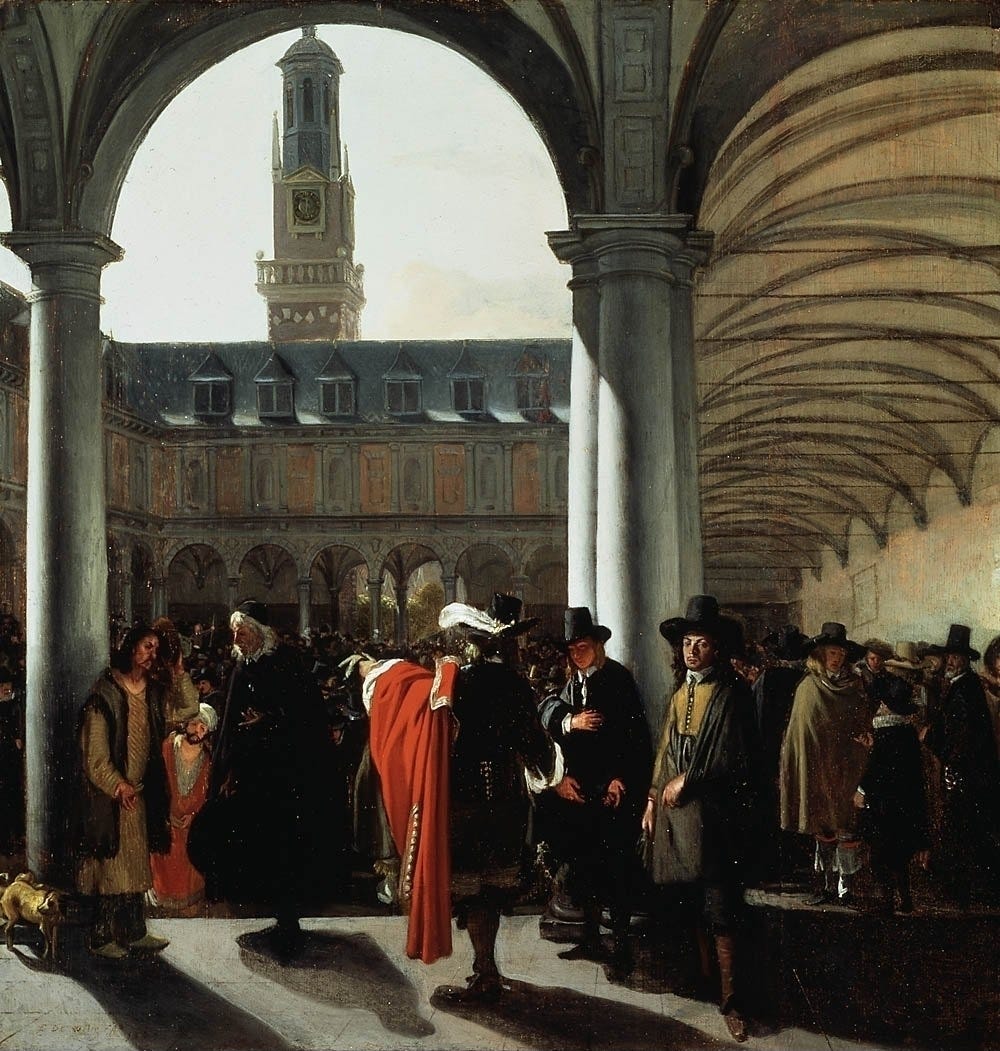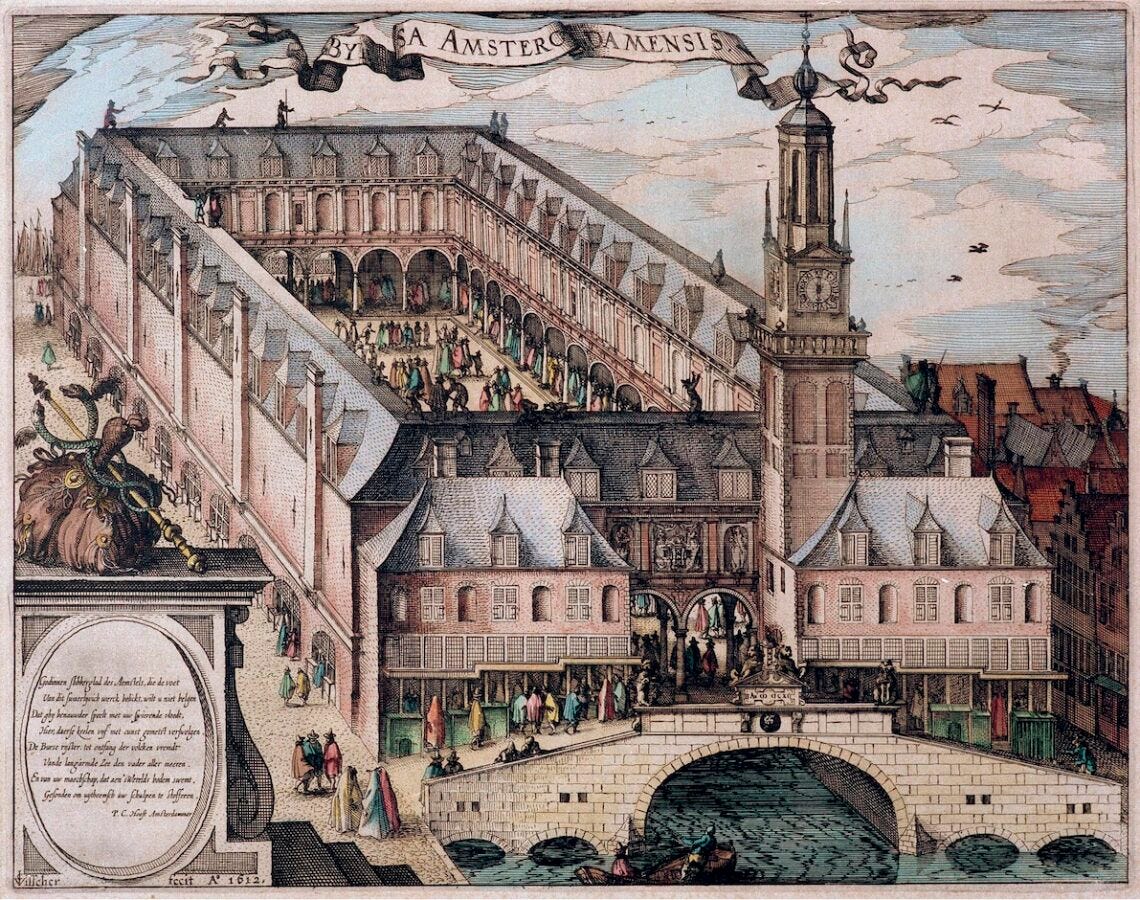The world's first stock exchange - and Margot Robbie in the bathtub
The novel's adaptation meant immersing myself in the world of trade. Not exactly my forte! But both the novel and Amsterdam's Golden Age history made it utterly fascinating.
In this Substack I’m recounting the journey of my film adaptation of The Coffee Trader - an epic undertaking that delivered a great script about a forbidden Jewish love story in 1650 Amsterdam in a world of double crosses, hidden agendas, murder, excommunication - and coffee, of course!
If you’re new to the journey, here are the posts about what’s happened so far: getting approached about doing an adaptation (and the hesitation of doing one); being in the room where it happens (about pitches and being human); writing the proposal (the full proposal and thoughts about making strong choices); waiting for the Go (about deadlines and retaining one’s balance); research in Amsterdam (where that Golden Age history is still omnipresent; and finally, if you’re can’t wait to discover The Coffee Trader - here are both the first and the final script.
This time a look at something that made the novel intriguing, and that would make the movie singularly fascinating: The world’s very first stock exchange! Today Euronext simply adds the following bit of history to its website: “From the first 17th century marketplace to providing tomorrow's sustainable growth products, Euronext has been financing the real economy for over 400 years.”
While, technically, there had been stock markets of sorts hundreds of years before in places such as Venice, Florance and Genoa - but Amsterdam took it all to a whole new level and its stock exchange is thus considered the oldest modern securities market in the world.
Amsterdam and the Dutch Republic have a most storied history. Feel free to read up on it here. It’s quite amazing what the small country achieved in a very short period of time - the Golden Age of Amsterdam (1585-1672) will always be remembered for its far-reaching achievements: the famed Dutch East India Company (the world’s first multi-national corporation); the first modern stock exchange; the expansion to Brazil, Curacao, Aruba, Bonaire, New Amsterdam (yep, let’s not forget that the Dutch started New York City), Batavia (now Jakarta) and on and on; the social stability - a focus on merit and wealth, not on nobility; religious freedom - the clergy was less powerful and other religions were tolerated; science, culture, philosophy, art - you name it. As part of my research, luckily, I got to explore Amsterdam in person.
What fertile ground for a novel - and a high-stakes Hollywood film! It will come as no surprise to learn that, in a story called ‘The Coffee Trader,’ trading plays a big part. The protagonist is indeed a trader falling on hard times, with a few trades gone wrong - when the obscure coffee fruit is brought to his attention - then adventure, on so many levels, ensue! I had to learn about trading and some of the terminology - and then try to make it both dramatic and visual for the big screen. While I didn’t have the brilliant idea of putting champagne-drinking Margot Robbie into a bathtub (where she explains the financial shenanigans in The Big Short), I did give my exposition wrapped in sex … actually, I guess not that different, after all!
Back to the Amsterdam Stock Exchange! They were highly structured - and exceedingly smart in the way they ran those operations. One particular law about trade in the city allowed for trading only at the exchange - and only on weekdays between eleven AM and noon - one hour! That meant that a great deal was always happening in that one hour, when everyone, with regard to every trade, came together in that one place. In essence, in that one hour, everyone was on hand, and everything that needed trading, was traded in that brief time period. Highly efficient - and that one-hour time lock also allowed me to add additional urgency for my protagonist.
Should you be interested in finance, in investing/trading, in stock exchanges - here’s a great read for you and one I, of course, read it when researching for The Coffee Trader: Confusion of Confusions, by Joseph de la Vega. For anyone in the business, this book is still considered a classic. And if you know nothing so far, then this is a great way to learn. Joseph de la Vega was a Sephardic Jewish merchant (like the film’s protagonist) and his book is a study about the same Amsterdam Stock Exchange and its shareholders. He explains puts and calls and everything else - and Wikipedia says that his book ‘helped lay the foundations for modern fields of technical analysis and behavioral finance.’
Enough for now - when I next recount the epic journey of the Coffee Trader adaptation, I shall tackle the period from first to second draft - always a most interesting period for a screenwriter. Why? I’ll explain next time!




